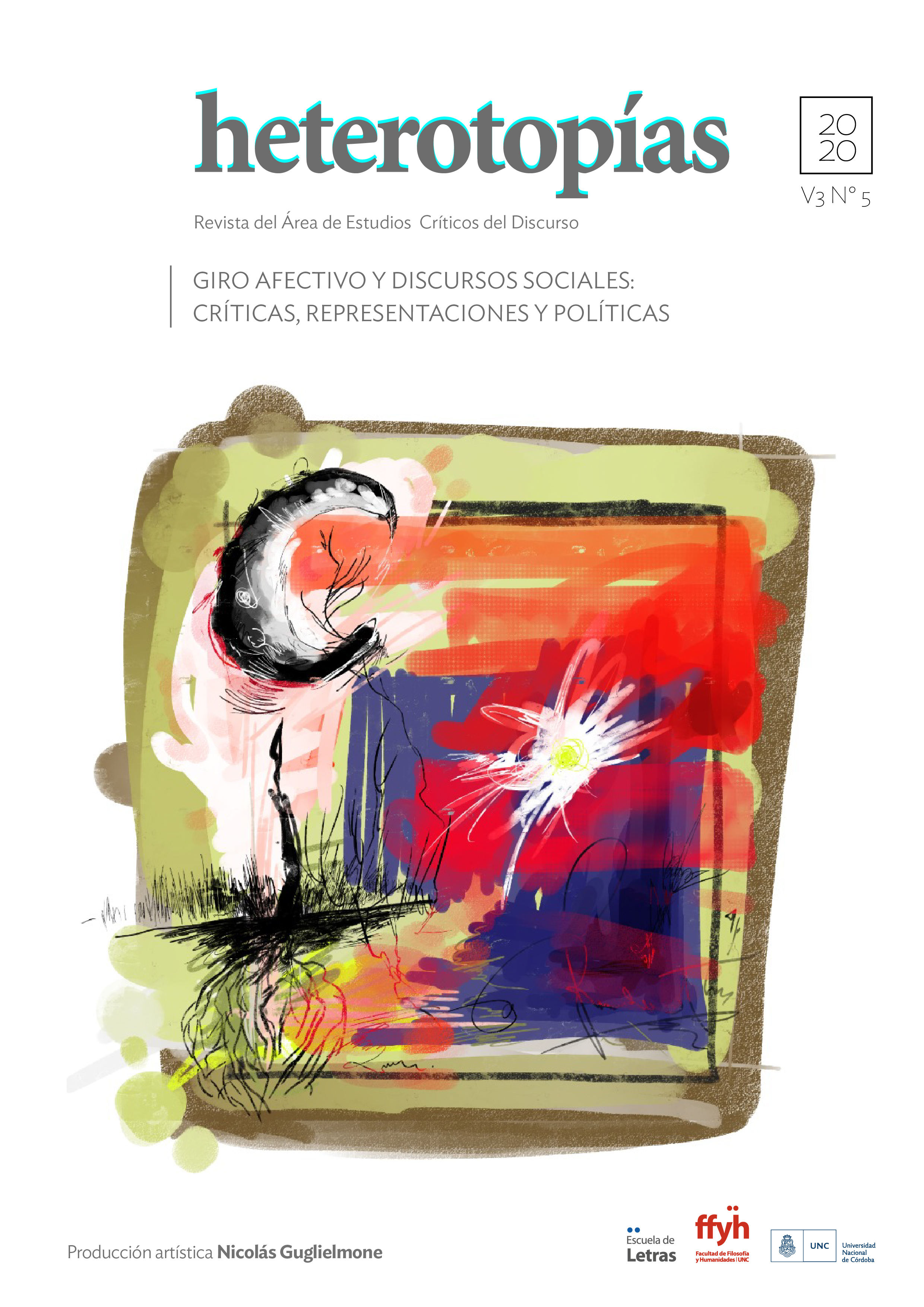"It's what i feel": the place of affects in feminist conversation
Main Article Content
Abstract
If we had to define -as it seems to be convenient for the introductory gender- the so-called affective turn, we could take the words of otrxs and agree, with Nicolás Cuello (2019), that it is about "a field of theoretical-reflexive experimentation" (p.11) where investigations and explorations of feminist and queer nature coexist in which the political relevance of the affections and emotions in public life is expressed. In the words of Macón and Solana (2015), it is "a project aimed at exploring alternative ways of approaching the affective, passionate or emotional dimension [...] from its role in public space" (pp. 15-16).
Downloads
Article Details

This work is licensed under a Creative Commons Attribution-NonCommercial-ShareAlike 4.0 International License.
Those authors who have publications with this journal, accept the following terms: Those authors who have publications with this journal, accept the following terms:
a. The authors will keep their copyright and guarantee to the journal the right of first publication of their work, which will be simultaneously subject to the Creative Commons Attribution - Non-Commercial - Share Alike (by-nc-sa) Attribution License; no commercial use of the original work or any derivative works is allowed, the distribution of which must be done with a license equal to the one that regulates the original work.
b. Authors may adopt other non-exclusive license agreements for the distribution of the published version of the work (e.g., deposit it in an institutional telematic archive or publish it in a monographic volume) provided that the initial publication in this journal is indicated.
c. Authors are allowed and recommended to disseminate their work through the Internet (e.g. in institutional telematic archives or on their website) before and during the submission process, which may lead to interesting exchanges and increase the number of citations of the published work. (See The effect of open access).
References
Ahmed, S. (2015). La política cultural de las emociones. México: PUEG-UNAM.
Benjamin, W. (2005). Libro de los pasajes. Madrid: Akal.
Boria, A. y Anastasía, P. (Comps.). (2019). Prácticas teóricas 3: el lugar de los afectos. Córdoba: CEA-FCS-UNC.
Butler, J. (2006). Vida precaria. El poder del duelo y la violencia. Buenos Aires: Paidós.
Butler, J. (2010). Marcos de guerra. Las vidas lloradas. Buenos Aires: Paidós.
Cano, V. (2018). Solx no se nace, se llega a estarlo. Ego-liberalismo y auto-precarización afectiva. En Nijensohn, M. (Comp.). Los feminismos ante el neoliberalismo (pp. 27-38). Buenos Aires: LatFem-La Cebra.
Canseco, A. (2017). Eroticidades precarias. La ontología corporal de Judith Butler. Córdoba: Asentamiento Editora-Sexualidades Doctas.
Cuello, N. (2019). Presentación: El futuro es desilusión. En Ahmed, S. La promesa de la felicidad. Una crítica cultural al imperativo de la alegría (pp. 11-20). Buenos Aires: Caja Negra.
Cvetkovich, A. (2012). Depression: A Public Feeling. Durham: Duke University Press.
Cvetkovich, A. (2018). Un archivo de los sentimientos: trauma, sexualidad y culturas públicas lesbianas. Barcelona: Bellaterra.
Depetris Chauvin, I. y Taccetta, N. (Comps.) (2019). Afectos, historia y cultura visual. Una aproximación indisciplinada. Buenos Aires: Prometeo.
Flatley, J. (2008). Affective Mapping. Melancholia and the Politics of Modernity. Cambridge-London: Harvard University Press.
flores, v. (2017). interruqciones. Ensayos de poética activista. Escritura, poética, pedagogía. Córdoba: Editorial Asentamiento.
flores, v. (2019). Palabras preliminares. Sentirse precari*s. Afectos, emociones y gobiernos de los cuerpos. En Moretti, I. y Perrote, N. (Eds.). Sentirse precari*s. Afectos, emociones y gobiernos de los cuerpos (pp. 19-23). Córdoba: Editorial UNC.
Halberstam, J. (2018). El arte queer del fracaso. Barcelona-Madrid: Egales.
Losiggio, D. y Macón, C. (Eds.). (2017). Afectos políticos. Ensayos sobre actualidad. Buenos Aires: Miño y Dávila.
Massumi, B. (1995). The Autonomy of Affect. Cultural Critique, 31(2), 83-109.
Macón, C. (2013). Sentimus ergo sumus. El surgimiento del “giro afectivo” y su impacto sobre la filosofía política. Revista Latinoamericana de Filosofía Política, 2(6), 1-32.
Macón, C. y Solana, M. (Eds.). (2015). Pretérito indefinido. Afectos y emociones en las aproximaciones al pasado. Buenos Aires: Título.
Moretti, I. y Perrote, N. (Eds.). (2019). Sentirse precari*s. Afectos, emociones y gobiernos de los cuerpos. Córdoba: Editorial UNC.
Pons Rabasa, A. (2019). Desafíos epistemológicos en la investigación feminista: hacia una teoría encarnada del afecto. Debate Feminista, 29(57), 134-155.
Sedgwick, E. K. y Frank, A. (2018 [1995]). La vergüenza en el pliegue cibernético: una lectura de Silvan Tomkins. En Sedgwick, E. K. Tocar la fibra. Afecto, pedagogía, performatividad (pp. 97-126). Barcelona: Alpuerto.
song, e. (2019). Introducción. Una introducción está siendo escrita. En Boria, A. y Anastasía, P. (Comps.). Prácticas teóricas 3: el lugar de los afectos (pp. 13-22). Córdoba: CEA-FCS-UNC.
